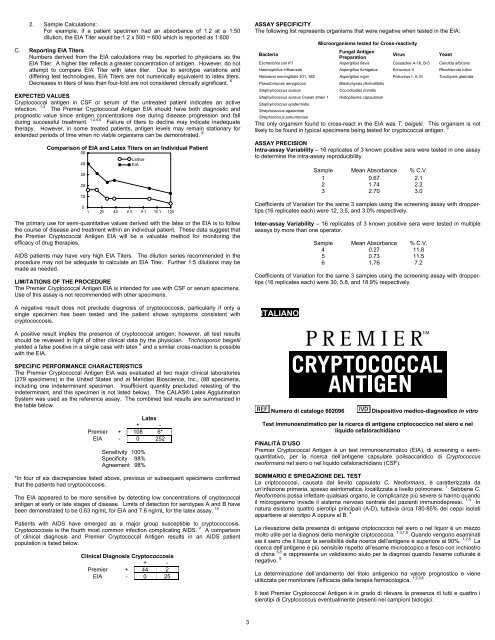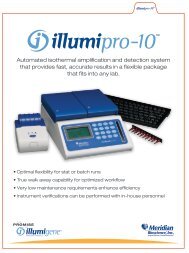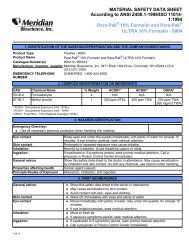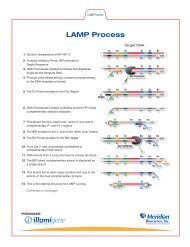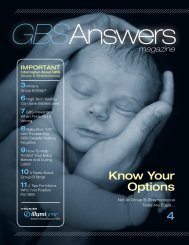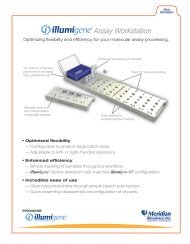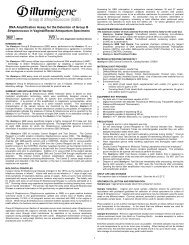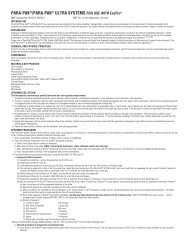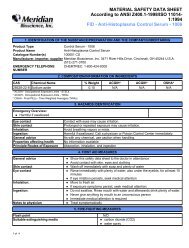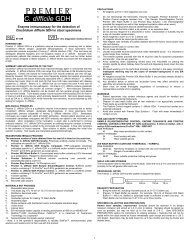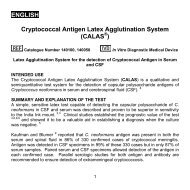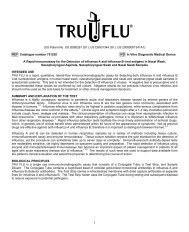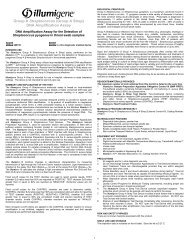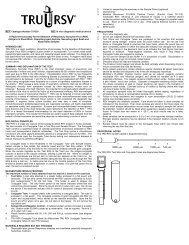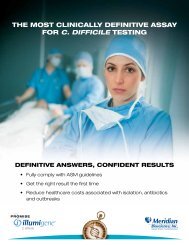Premier™ Cryptococcal Antigen - Meridian Bioscience, Inc.
Premier™ Cryptococcal Antigen - Meridian Bioscience, Inc.
Premier™ Cryptococcal Antigen - Meridian Bioscience, Inc.
You also want an ePaper? Increase the reach of your titles
YUMPU automatically turns print PDFs into web optimized ePapers that Google loves.
2. Sample Calculations:<br />
For example, if a patient specimen had an absorbance of 1.2 at a 1:50<br />
dilution, the EIA Titer would be:1.2 x 500 = 600 which is reported as 1:600<br />
C. Reporting EIA Titers<br />
Numbers derived from the EIA calculations may be reported to physicians as the<br />
EIA Titer. A higher titer reflects a greater concentration of antigen. However, do not<br />
attempt to compare EIA Titer with latex titer. Due to serotype variations and<br />
differing test technologies, EIA Titers are not numerically equivalent to latex titers.<br />
Decreases in titers of less than four-fold are not considered clinically significant. 6<br />
EXPECTED VALUES<br />
<strong>Cryptococcal</strong> antigen in CSF or serum of the untreated patient indicates an active<br />
infection. 1-3 The Premier <strong>Cryptococcal</strong> <strong>Antigen</strong> EIA should have both diagnostic and<br />
prognostic value since antigen concentrations rise during disease progression and fall<br />
during successful treatment. 1,2,5,6 Failure of titers to decline may indicate inadequate<br />
therapy. However, in some treated patients, antigen levels may remain stationary for<br />
extended periods of time when no viable organisms can be demonstrated. 8<br />
Comparison of EIA and Latex Titers on an Individual Patient<br />
The primary use for semi-quantitative values derived with the latex or the EIA is to follow<br />
the course of disease and treatment within an individual patient. These data suggest that<br />
the Premier <strong>Cryptococcal</strong> <strong>Antigen</strong> EIA will be a valuable method for monitoring the<br />
efficacy of drug therapies.<br />
AIDS patients may have very high EIA Titers. The dilution series recommended in the<br />
procedure may not be adequate to calculate an EIA Titer. Further 1:5 dilutions may be<br />
made as needed.<br />
LIMITATIONS OF THE PROCEDURE<br />
The Premier <strong>Cryptococcal</strong> <strong>Antigen</strong> EIA is intended for use with CSF or serum specimens.<br />
Use of this assay is not recommended with other specimens.<br />
A negative result does not preclude diagnosis of cryptococcosis, particularly if only a<br />
single specimen has been tested and the patient shows symptoms consistent with<br />
cryptococcosis.<br />
A positive result implies the presence of cryptococcal antigen; however, all test results<br />
should be reviewed in light of other clinical data by the physician. Trichosporon beigelii<br />
yielded a false positive in a single case with latex 9 and a similar cross-reaction is possible<br />
with the EIA.<br />
SPECIFIC PERFORMANCE CHARACTERISTICS<br />
The Premier <strong>Cryptococcal</strong> <strong>Antigen</strong> EIA was evaluated at two major clinical laboratories<br />
(279 specimens) in the United States and at <strong>Meridian</strong> <strong>Bioscience</strong>, <strong>Inc</strong>., (88 specimens,<br />
including one indeterminant specimen. Insufficient quantity precluded retesting of the<br />
indeterminant, and this specimen is not listed below). The CALAS® Latex Agglutination<br />
System was used as the reference assay. The combined test results are summarized in<br />
the table below.<br />
Latex<br />
+ -<br />
Premier + 108 6*<br />
EIA - 0 252<br />
Sensitivity 100%<br />
Specificity 98%<br />
Agreement 98%<br />
*In four of six discrepancies listed above, previous or subsequent specimens confirmed<br />
that the patients had cryptococcosis.<br />
The EIA appeared to be more sensitive by detecting low concentrations of cryptococcal<br />
antigen at early or late stages of disease. Limits of detection for serotypes A and B have<br />
been demonstrated to be 0.63 ng/mL for EIA and 7.6 ng/mL for the latex assay. 10<br />
Patients with AIDS have emerged as a major group susceptible to cryptococcosis.<br />
Cryptococcosis is the fourth most common infection complicating AIDS. 2 A comparison<br />
of clinical diagnosis and Premier <strong>Cryptococcal</strong> <strong>Antigen</strong> results in an AIDS patient<br />
population is listed below.<br />
Clinical Diagnosis Cryptococcosis<br />
+ -<br />
Premier + 44 2<br />
EIA - 0 25<br />
3<br />
ASSAY SPECIFICITY<br />
The following list represents organisms that were negative when tested in the EIA:<br />
Microorganisms tested for Cross-reactivity<br />
Bacteria<br />
Fungal <strong>Antigen</strong><br />
Preparation<br />
Virus Yeast<br />
Escherichia coli K1 Aspergillus flavis Coxsackie A-16, B-5 Candida albicans<br />
Haemophilus influenzae Aspergillus fumigatus Echovirus II Rhodotorula rubra<br />
Neisseria meningitidis 301, 362 Aspergillus niger Poliovirus I, II, III Torulopsis glabrata<br />
Pseudomonas aeruginosa Blastomyces dermatitidis<br />
Staphylococcus aureus Coccidioides immitis<br />
Staphylococcus aureus Cowan strain 1<br />
Staphylococcus epidermidis<br />
Streptococcus agalactiae<br />
Streptococcus pneumoniae<br />
Histoplasma capsulatum<br />
The only organism found to cross-react in the EIA was T. beigelii. This organism is not<br />
likely to be found in typical specimens being tested for cryptococcal antigen. 9<br />
ASSAY PRECISION<br />
Intra-assay Variability – 16 replicates of 3 known positive sera were tested in one assay<br />
to determine the intra-assay reproducibility.<br />
Sample Mean Absorbance % C.V.<br />
1 0.67 2.1<br />
2 1.74 2.2<br />
3 2.70 3.0<br />
Coefficients of Variation for the same 3 samples using the screening assay with droppertips<br />
(16 replicates each) were 12, 3.5, and 3.0% respectively.<br />
Inter-assay Variability – 16 replicates of 3 known positive sera were tested in multiple<br />
assays by more than one operator.<br />
Sample Mean Absorbance % C.V.<br />
4 0.27 11.8<br />
5 0.73 11.5<br />
6 1.76 7.2<br />
Coefficients of Variation for the same 3 samples using the screening assay with droppertips<br />
(16 replicates each) were 30, 5.8, and 18.9% respectively.<br />
ITALIANO<br />
Numero di catalogo 602096 Dispositivo medico-diagnostico in vitro<br />
Test immunoenzimatico per la ricerca di antigene criptococcico nel siero e nel<br />
liquido cefalorachidiano<br />
FINALITÀ D’USO<br />
Premier <strong>Cryptococcal</strong> <strong>Antigen</strong> è un test immunoenzimatico (EIA), di screening o semiquantitativo,<br />
per la ricerca dell’antigene capsulare polisaccaridico di Cryptococcus<br />
neoformans nel siero o nel liquido cefalorachidiano (CSF).<br />
SOMMARIO E SPIEGAZIONE DEL TEST<br />
La criptococcosi, causata dal lievito capsulato C. Neoformans, è caratterizzata da<br />
un’infezione primaria, spesso asintomatica, localilzzata a livello polmonare. 1 Sebbene C.<br />
Neoformans possa infettare qualsiasi organo, le complicanze più severe si hanno quando<br />
il microganismo invade il sistema nervoso centrale dei pazienti immunodepressi. 1-3 In<br />
natura esistono quattro sierotipi principali (A-D), tuttavia circa l’80-85% dei ceppi isolati<br />
appartiene al sierotipo A oppure al B. 4<br />
La rilevazione della presenza di antigene criptococcico nel siero o nel liquor è un mezzo<br />
molto utile per la diagnosi della meningite criptococcica. 1-3,7,8 Quando vengono esaminati<br />
sia il siero che il liquor la sensibilità della ricerca dell’antigene è superiore al 90%. 1,2,8 La<br />
ricerca dell’antigene è più sensibile rispetto all’esame microscopico a fesco con inchiostro<br />
di china 5,8 e rappresenta un validissimo aiuto per la diagnosi quando l’esame colturale è<br />
negativo. 8<br />
La determinazione dell’andamento del titolo antigenico ha valore prognostico e viene<br />
utilizzata per monitorare l’efficacia della terapia farmacologica. 1,2,5,6<br />
Il test Premier <strong>Cryptococcal</strong> <strong>Antigen</strong> è in grado di rilevare la presenza di tutti e quattro i<br />
sierotipi di Cryptococcus eventualmente presenti nei campioni biologici.


